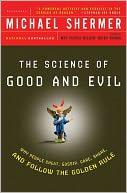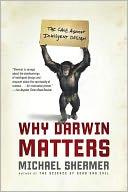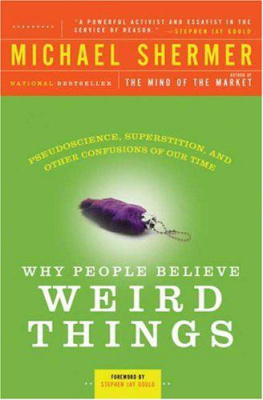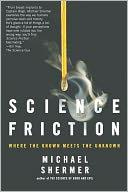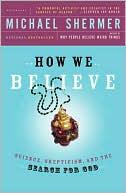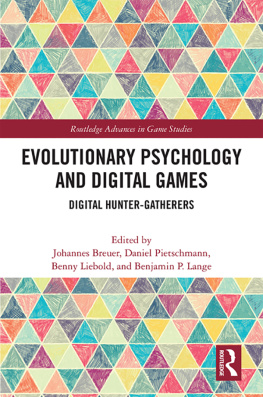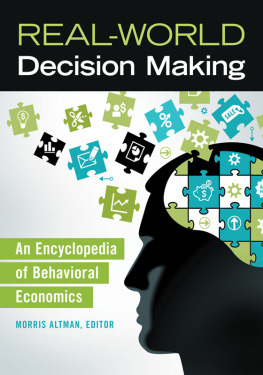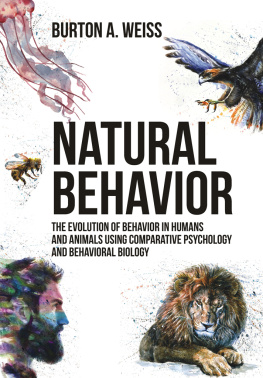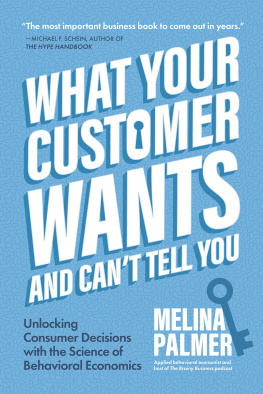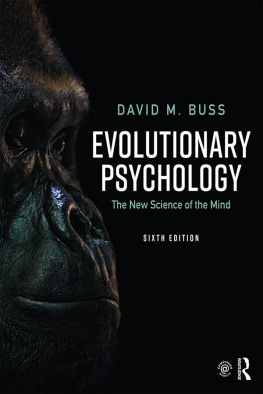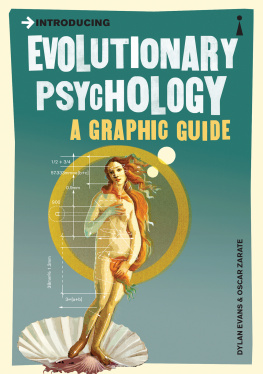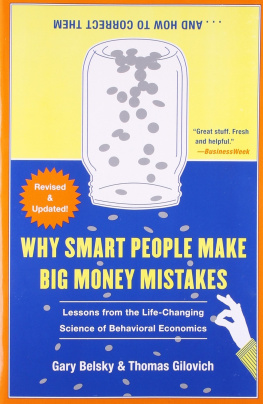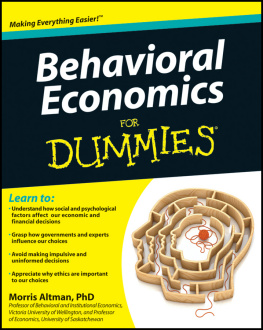ACKNOWLEDGMENTS
I would like to acknowledge the support of the Gruter Institute for Law and Behavioral Research, a private nonprofit institute that has fostered interdisciplinary research and teaching designed to inform law, economics, and other social sciences about the latest scientific findings about human behavior. Most notably I thank Monika Gruter Cheney and Oliver Goodenough at the Gruter Institute, and especially Paul Zak for sharing an early draft of his edited scholarly volume Moral Markets: The Critical Role of Values in Free Enterprise, also supported by the Gruter Institute and published by Princeton University Press. The John Templeton Foundation and the Ann and Gordon Getty Foundation supported of this work through the Gruter Institute.
Special thanks go to those economists, scholars, and scientists from various fields who took the time to read one or more chapters or the entire manuscript and offer constructive criticism and helpful comments, or to sit down with me for interviews and conversations, including (in alphabetical order): Colin Camerer, Randy Cassingham, Monika Gruter Cheney, David Cowan, Mihaly Csikszentmihalyi, Craig Fox, Oliver Goodenough, Stan Liebowitz, Stephen Margolis, Barnaby Marsh, Gerry Ohrstrom, Russell Poldrack, David B. Schlosser, Jay Stuart Snelson, Paul Zak, and Philip Zimbardo.
As I have in all of my books, I would like to acknowledge a number of individuals who have contributed not only to this book but to my work in general, starting with my agents Katinka Matson and John Brockman, not only for their personal support but for what they have done to help shape the genre of science writing into a third culture of what I call integrative science, where one integrates data, theory, and narrative into a unified whole. And to my lecture agent, Scott Wolfman, for having the courage to market science and skepticism as a viable form of entertainment for college campuses, and for being such a good friend. Thanks as well to Paul Golob at Henry Holt/Times Books, who oversaw the project, and especially to the amazing Robin Dennis, my brilliant editor, who has greatly shaped my thinking and writing into a finer prose than I otherwise would have produced. I also acknowledge my remarkable copy editor, Emily DeHuff, who saved me much literary embarrassment with her many excellent suggestions, my production editor, Chris OConnell, and the designer of the book, Victoria Hartman, whose typography, layout, and design elevated the book to elegance.
I also wish to recognize the office staff of the Skeptics Society and Skeptic magazine, including Pat Linse, Tanja Sterrmann, Stephanie Luu, Nicole McCullough, Ann Edwards, Daniel Loxton, Emrys Miller, William Bull; senior editor Frank Miele; senior scientists David Naiditch, Bernard Leikind, Liam McDaid, and Thomas McDonough; contributing editors Tim Callahan, Tom McIver, and Harry Ziel; editorial assistant Sara Meric; photographer David Patton and videographer Brad Davies for their visual record of the Skeptics Caltech Science Lecture Series. I would also like to recognize Skeptic magazines board members: Richard Abanes, David Alexander, the late Steve Allen, Arthur Benjamin, Roger Bingham, Napoleon Chagnon, K. C. Cole, Jared Diamond, Clayton J. Drees, Mark Edward, George Fischbeck, Greg Forbes, the late Stephen Jay Gould, John Gribbin, Steve Harris, William Jarvis, Lawrence Krauss, Gerald Larue, William McComas, John Mosley, Richard Olson, Donald Prothero, James Randi, Vincent Sarich, Eugenie Scott, Nancy Segal, Elie Shneour, Jay Stuart Snelson, Julia Sweeney, Frank Sulloway, Carol Tavris, and Stuart Vyse.
Thanks as well for the institutional support for the Skeptics Society at the California Institute of Technology goes to David Baltimore, Susan Davis, Chris Harcourt, Ram Basu, Debbie White, Hall Daily, Gail Wash, and Kip Thorne. Likewise, I appreciate the institutional support of the School of Politics and Economics at Claremont Graduate University, most notably Paul Zak, Thomas Willett, Thomas Borcherding, and Arthur Denzau. As always, I acknowledge my friends at KPCC 89.3 FM radio in Pasadena, most notably Larry Mantle, Ilsa Setziol, Jackie Oclaray, Julia Posie, and Linda Othenin-Girard, who have been good friends and valuable supporters of promoting science and critical thinking on the air. My friends Charles Bennett and Robert Zeps have been especially supportive of both the Skeptics Society as well as the skeptical movement in America, and I would like to acknowledge the generous support of the Skeptics Society from Jerome V. Broschart, Tom Glover, Matthew D. Madison and Sharon E. Madison, Ted A. Semon, Daniel Mendez, Robert and Mary Engman, and Whitney L. Ball. Finally, special thanks go to those who help at every level of our organization: Stephen Asma, Jaime Botero, Jason Bowes, Jean Paul Buquet, Adam Caldwell, Bonnie Callahan, Tim Callahan, Cliff Caplan, Randy Cassingham, Shoshana Cohen, John Coulter, Brad Davies, Janet Dreyer, Bob Friedhoffer, Michael Gilmore, Tyson Gilmore, Andrew Harter, Diane Knudtson, Joe Lee.
First among equals in friendship and support are John Rennie and Mariette DiChristina at Scientific American for providing skepticism a monthly voice that reaches so many people. I look forward each month to writing my column more than just about anything else I do in my working life.
Finally, I thank my daughter, Devin, for bringing so much joy just by being herself, and to my wife, Kim, with whom I have now shared life for two decades.
ABOUT THE AUTHOR
M ICHAEL S HERMER is the founding publisher of Skeptic magazine (www.skeptic.com) and the executive director of the Skeptics Society. A monthly columnist for Scientific American and an adjunct professor of economics at Claremont Graduate University, he is also the host of the Skeptics Distinguished Science Lecture Series at the California Institute of Technology (Caltech) and the cohost and producer of the thirteen-hour Family Channel television series Exploring the Unknown. About Shermer, the late Stephen Jay Gould wrote, As head of one of Americas leading skeptic organizations, and as a powerful activist and essayist in the service of this operational form of reason, [he] is an important figure in American public life.
Shermer is the author of numerous books, including a trilogy on belief: the bestselling Why People Believe Weird Things, on pseudoscience, superstitions, and other confusions of our time; How We Believe: Science, Skepticism, and the Search for God, on the origins of religion and why people believe in God; and The Science of Good and Evil: Why People Cheat, Gossip, Share Care, and Follow the Golden Rule, on the evolutionary origins of morality. He has also published two collections of essays: Science Friction: Where the Known Meets the Unknown, about how the mind works and how thinking goes wrong, and The Borderlands of Science, about the fuzzy land between science and pseudoscience. He is also the author of a biography, In Darwins Shadow, about the life and science of the codiscoverer of natural selection, Alfred Russel Wallace, and Denying History, on Holocaust denial and other forms of pseudohistory.
Shermer earned his B.A. in psychology from Pepperdine University, his M.A. in experimental psychology from California State University at Fullerton, and his Ph.D. in the history of science from Claremont Graduate University. He has taught psychology, evolution, and the history of science at Occidental College; California State University, Los Angeles; and Glendale College.
He lives in Southern California.
Bestselling author and psychologist Michael Shermer
explores the science behind how we think
in these titles available from Holt Paperbacks


